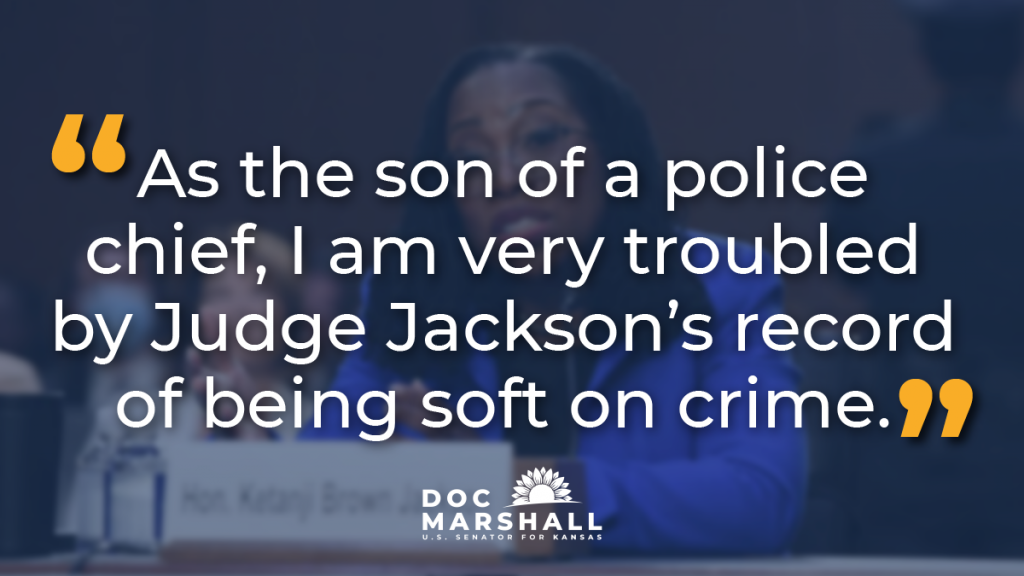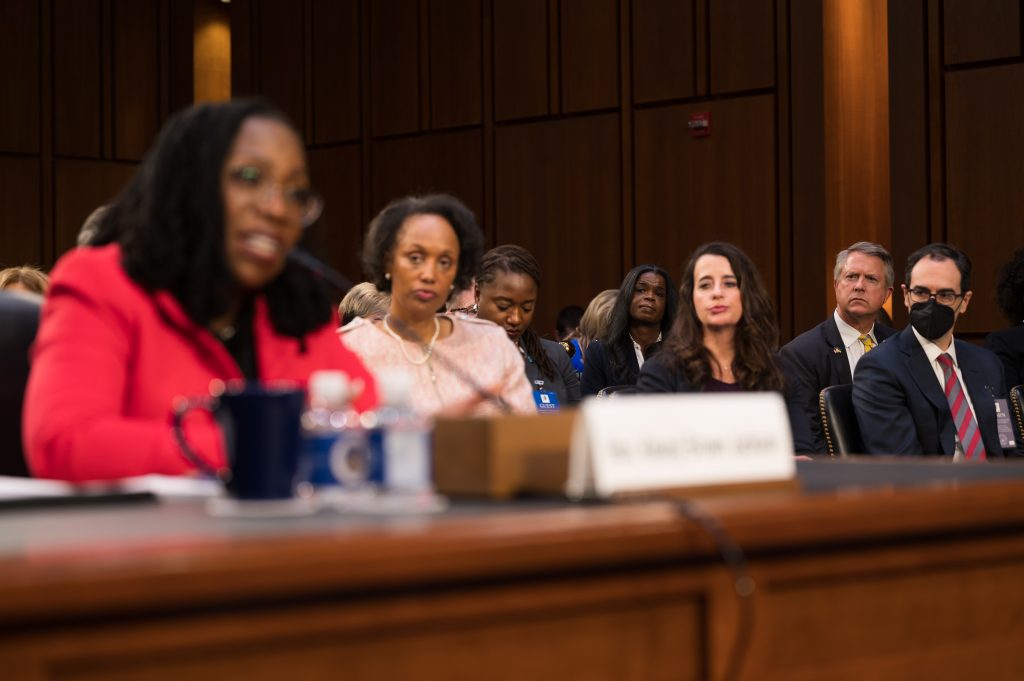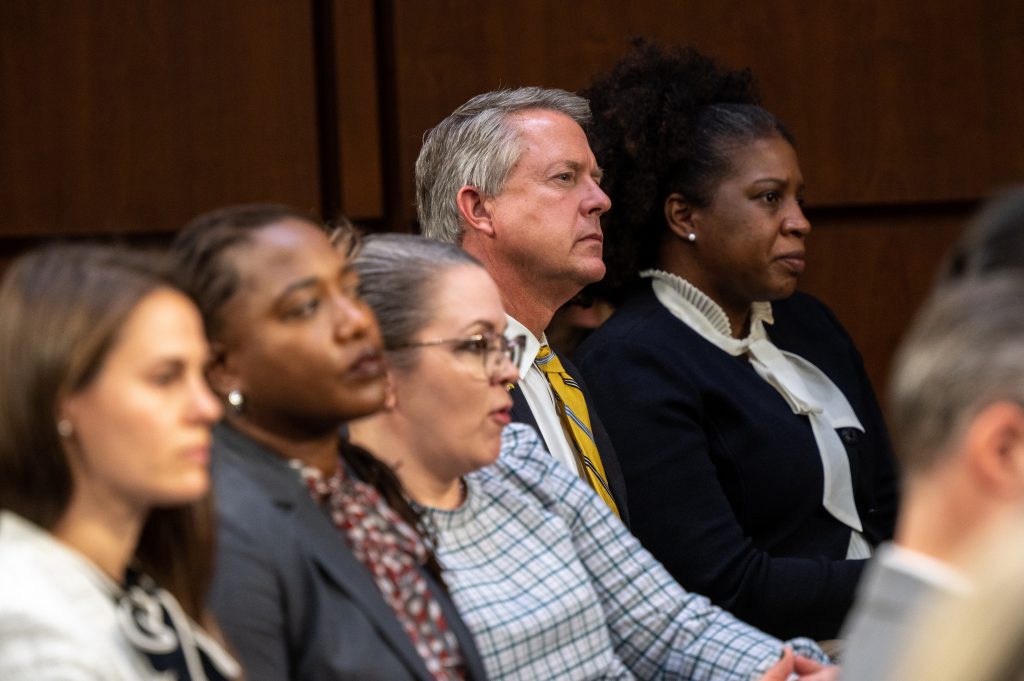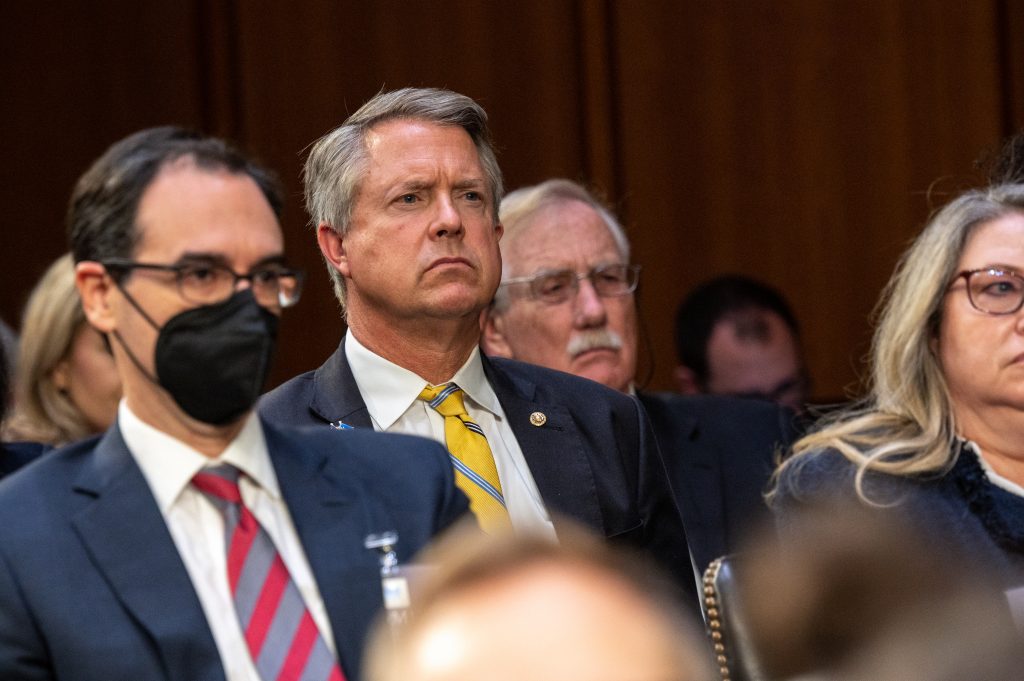- March 25, 2022
Sen. Marshall to Vote Against Judge Ketanji Brown Jackson for SCOTUS
(Washington, D.C., March 25, 2022) – U.S. Senator Roger Marshall, M.D. issued the following statement announcing he will vote against Judge Ketanji Brown Jackson to be an Associate Justice of the United States Supreme Court.
“After sitting in on some of Judge Jackson’s hearing and conducting a thorough and thoughtful review of her qualifications and judicial record, I cannot support her confirmation. As the son of a police chief, I am very troubled by Judge Jackson’s record of being soft on crime, one that has followed her through each stage of her legal career. As a practicing attorney, she worked to release dangerous prisoners from Guantanamo Bay. As a District Judge, she worked to wipe out President Trump’s expedited removal of illegal immigrants at our southern border and issued multiple lenient sentences for people convicted of possessing child pornography. That alone would be enough to oppose her confirmation but she has also demonstrated a tendency for legislating from behind the bench and an affinity to growing government. Not to mention, she lacks the serious experience needed to serve a lifelong term at our nation’s highest court. All that being said, I believe she will rubberstamp Biden’s far-left agenda instead of protecting the Constitution and our Kansas values. There is no way I can in good faith support her to be an Associate Justice on the U.S. Supreme Court,” said Senator Marshall.

Photos of Senator Marshall attending Judge Jackson’s confirmation hearing:



Background:
Newsmax: Sen. Roger Marshall: Jackson Would Be ‘Most Radically Left Activist’ Justice
”She’s soft on crime. She can’t run from that… this will be the most radically left activist judge on the Supreme Court when this is all said and done.”
Good Morning America: Senator Marshall Evaluates Supreme Court Confirmation hearings
“I certainly appreciate the civility of this particular hearing. I think Senators Grassley and Durbin have done a great job. I think the questions have been fair, and she presented herself well. But look, I think all of us have a big concern that she is soft on crime but we will do our best to give this process the respect that it deserves…”
Washington Post: The child pornography case at the center of Ketanji Brown Jackson’s hearing
“…Hawkins had come to the attention of law enforcement in 2012, when, as an 18-year-old, he uploaded to YouTube five videos of prepubescent boys engaged in sex acts. An undercover detective soon emailed him, suggesting the two had “similar interests.” Hawkins emailed the agent two videos, and wrote that he was interested in boys ages 11 to 17. Authorities executed a search warrant in June, finding 17 videos and 16 images of boys on a laptop and a phone… Although federal guidelines called for a sentence of eight to 10 years, prosecutors said that given Hawkins’s age and lack of criminal record they recommended two years… Jackson imposed a prison term of three months, followed by three months of home detention and six years of supervision…”
Senate Republican Policy Committee: The Jurisprudence of Judge Ketanji Brown Jackson
“Judge Jackson cited a 2019 case involving a challenge to the Department of Homeland Security’s decision to expand the category of noncitizens subject to expedited removal processes as one of the 10 most significant cases of her career. In that case, Judge Jackson issued a nationwide injunction to stop the DHS effort. In her opinion she wrote that the Trump administration’s legal argument “reeks of bad faith” and “demonstrates contempt for the authority that the Constitution’s Framers have vested in the judicial branch.” The D.C. Circuit reversed Judge Jackson’s ruling and cancelled the injunction. The court held that, because Congress granted “sole and unreviewable discretion” to the DHS secretary to determine whether to expand expedited removal, the decision was not subject to judicial review and there was no legal basis for the injunction Judge Jackson had entered.”
The Hill: GOP raises red flag on Supreme Court nominee’s Guantánamo work
“…Jackson previously worked as a public defender in Washington, D.C., from 2005 to 2007, in the wake a landmark Supreme Court decision related to Guantánamo Bay detainees. During that time, her cases included work on behalf of Khi Ali Gul, a now-former prisoner at Guantánamo Bay, in the case Khi Ali Gul v. Bush. Jackson listed the case as one of the 10 most significant of her career in her responses to the Senate Judiciary Committee’s questionnaire for her Supreme Court nomination. After going to private practice, Jackson also worked on Supreme Court amicus briefs in cases related to Guantánamo Bay detainees including Boumediene v. Bush, on behalf of groups supporting challenging the Defense Department’s detention review system…”
FOX News: Supreme Court nominee Ketanji Brown Jackson, a politician in robes
“…Missing are details like her work drafting an amicus brief on behalf of pro-abortion organizations in a buffer zone case in which she repeatedly disparaged the peaceful and often prayerful clinic protesters as engaging in “in-your-face” and “chaotic” activity that somehow fell short of “pure speech.”… After her appointment to the district court in 2013, she compiled a record that reflected a hostility to both business and workers. She upheld an Obama administration meat labeling rule against a challenge from meat packers and a forest planning rule that was challenged by a coalition of timber, livestock, and off-highway vehicle organizations concerned about timber harvests falling and forest fires increasing. She also upheld a federal program that set explicit racial preferences in the awarding of government contracts. During the Trump administration, she struck down provisions of three executive orders limiting the time labor union officials could spend with union members, the issues that unions could bargain over in negotiations, and the rights of disciplined workers to appeal disciplinary actions—only to be reversed by the D.C. Circuit… Jackson overreached to enforce a House subpoena against former White House Counsel Don McGahn, but a D.C. Circuit panel later held that the House had failed to establish its entitlement to enforcement before the case was settled on appeal…”
Senate Judiciary Committee: Judge or Legislator?
“In cases involving the Trump administration, Judge Jackson blurred the lines between the judicial branch and legislative branch – making highly political decisions beyond her authority. However, she frequently deferred to decisions made by the Obama administration. Disregarding the text and plain meaning of the law, Judge Jackson issued an unusual nationwide injunction to prevent the Trump administration from deporting illegal immigrants… Ignoring extensive historical practice, Judge Jackson halted three executive orders signed by President Trump regarding federal labor-management relations… Yet Judge Jackson deferred to requests and decisions made by the Obama administration. Judge Jackson sided with the Department of Energy in 2015 in a lawsuit brought by renewable energy companies, after the Department argued that judicial review wasn’t necessary (See 156 F. Supp. 3d at 189–94.) The D.C. Circuit reversed Judge Jackson saying that she improperly and effectively dismissed an energy company’s claims without assessing their merits…”
NY Times: Judge Jackson’s Rulings: Detailed, Methodical and Leaning Left
“…In Judge Jackson’s eight months on the appeals court, she has issued just two majority opinions, and they have been crisp and forceful. In a concurring statement issued Thursday, she staked out a position on an issue that often engages the Supreme Court: whether it is appropriate to vacate a lower court’s opinion after a case becomes moot.”
CBS News: Mitch McConnell says he opposes Ketanji Brown Jackson’s Supreme Court nomination
“…McConnell also indicated that Jackson has too slim of a record from her near-year on the D.C. Circuit. During her tenure there, she has issued two written decisions, which McConnell contrasted with the number of opinions from Justices Neil Gorsuch, Brett Kavanugh and Amy Coney Barrett during their years on the federal appeals court.”…
“…When Justice Gorsuch was nominated to the Supreme Court, he’d written more than 200 circuit court opinions that Senators could study. Justice Kavanaugh had written more than 300. Justice Barrett outpaced them both. She wrote almost 100 appellate opinions in just three years, plus years of scholarship as a star professor that Senators could examine. Judge Jackson has been on the D.C. Circuit for less than one year. She has published only two opinions.”
###


